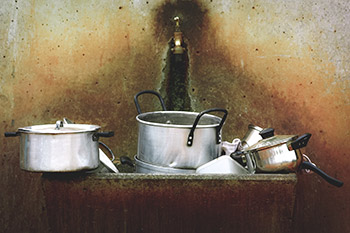10 Things to Never Put in Your Dishwasher
You Are Here: Home > Automatic Appliance Parts Blog > 10 Things to Never Put in Your Dishwasher
*** Please be aware that Norridge is the only shipping facility. Inventory on-hand at all other branches is unavailable for immediate shipment. ***
Dishwashers are sophisticated home appliances. Thick insulation reduces the level of operating noise, and adjustable racks make easy work of loading and unloading items. Some of the newest models are almost silent, while other models allow you to skip pre-rinsing dishes entirely.
While it's safe and efficient to wash most of your dirty dishes in the dishwasher, many kitchen tools and serving pieces need to be hand-washed instead. Find out which 10 items you should never place in your dishwasher.
Aluminum
Aluminum, including anodized aluminum, should always be washed by hand. The intense hot water in the dishwasher can stain the surface of aluminum. Dishwasher detergents can also dull the finish on aluminum pots and pans. In addition, aluminum dishes can mark other non-aluminum items in the dishwasher as they move around during the washing cycle.
Brass, Bronze, Copper, and Pewter
Heat and dishwasher detergent can discolor or cause pitting on objects made with these metals. To prevent damage to these pieces, wash them by hand with warm water and a mild detergent.
Cast Iron
Home cooks covet well-seasoned cast-iron cookware and grill pans in their kitchens. The seasoning, the glossy finish on the cookware that allows food to cook evenly without sticking, makes cast iron especially desirable. Cast iron needs careful treatment to prevent rusting and damage. The combination of dishwasher detergent and the heat produced by the dishwasher strips cast iron of its seasoned surface, which damages the cookware in the process.
To clean a seasoned cast-iron pan, use hot water and a sponge or soft cloth to gently wipe away food particles. To remove burned-on food residue in a cast-iron skillet, mix together salt and white vinegar in the pan. Place the pan on the stove and let the vinegar mixture come to a boil. After that, discard the vinegar mixture and place the pan on top of the stove over a low flame to dry it. Finally, brush the pan's interior with a thin coating of vegetable oil or food-grade mineral oil to preserve the seasoning.
Certain Types of Plastic
According to Don Huber, director of product safety for Consumer Reports, the heat from a dishwasher can cause harmful chemicals such as BPA and phthalates to leach out from certain plastic products that contain them, such as disposable plastics. Always read manufacturers' usage labels to confirm whether you can wash plastic products in the dishwasher. For plastics that can go into the dishwasher, place them on the top rack, as far away from the dishwasher's heating element as you can.
China with Metallic Decoration
Look carefully at your china before you wash it. If your china pieces contain metallic images or metallic trim, hand-wash them to avoid damaging the ornamentation on your china cups, bowls, and plates. While some types of china are dishwasher-safe, it's important to handle them carefully when placing them in the dishwasher. China pieces can chip if they accidentally knock into each other or other items in the dishwasher.
Intricate Pieces of Flatware
Gold-plated flatware and flatware with bone, plastic, or wood inlays in the handles should never be placed in the dishwasher. The force of the water and heat can loosen components on the flatware and weaken joints that connect the handles with fork tines, spoon faces, and knife blades.
Kitchen Knives
When you buy a set of kitchen knives, you're investing in an essential piece of cooking equipment. To keep them performing at their best, you need to take good care of them, and that care includes washing them. Sharp knives can become dull when they rub against other cutlery pieces in the dishwasher, so you should always wash them by hand.
Nonstick Pots and Pans
When it comes to your pots and pans, you should check the manufacturers' care labels carefully. Unless otherwise specified, nonstick cookware should always be washed by hand. Over time, the intense heat from the dishwasher can break down the nonstick coating on pots and pans. As a result, this coating will eventually chip or flake off of your cookware.
Stainless Steel With Sterling or Silver-Plated Pieces
Many professional silverware dealers agree that it's best to hand-wash sterling silver and silver-plated utensils because the process is gentler than using the dishwasher. You can wash stainless steel silverware in the dishwasher because it would take a long time and many cycles for any damage to occur. However, if you also plan on washing sterling or silver-plated pieces, you should keep your stainless steel items out of the dishwasher. The two metals will react with one another, causing irreversible damage to the finish of both the stainless steel and silver.
If you're concerned about damaging a vintage piece of silverware, wash it by hand. If you're cleaning new pieces of silverware for the first time, be sure to wash and dry the pieces by hand after the first few uses to prevent spotting from occurring. Afterward, you should be able to wash the silverware in the dishwasher — just use less detergent than normal, and don't run the dry cycle.
After the rinse cycle, remove the silverware from your dishwasher and dry the pieces by hand with a soft cloth. The dishwasher's heat can cause detergent residue to bake onto the metal's surface, leaving your silver dull and discolored if you don't dry it effectively.
Wooden Kitchen Items
Heat, water, and wood aren't a great combination for your go-to kitchen utensils and serving pieces. Cutting boards, wooden spoons, and salad bowls can crack and split in the dishwasher. Always wash these items by hand using a mild detergent instead, and allow them to air dry completely before using them again or putting them away.
Now that you know which items shouldn't go in the dishwasher, you'll be able to take better care of your cookware. However, you need to take care of your dishwasher as well. Even the most well-maintained dishwashers may occasionally need repair.
Automatic Appliance Parts Corporation supplies quality appliance parts and accessories for all major appliance brands. With seven retail stores serving the Chicago area and a robust online catalog, we can help you find the parts you need to get your appliances working correctly again. For more information, call us at 800-323-0270.

 Shopping Cart [empty]
Shopping Cart [empty]












